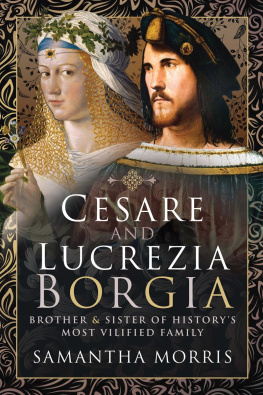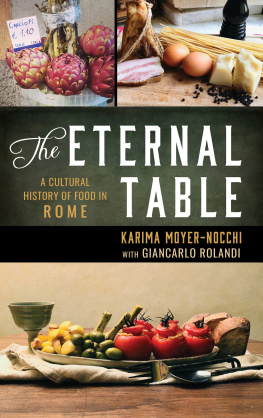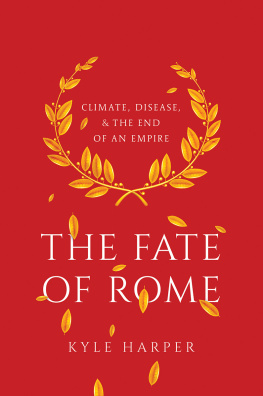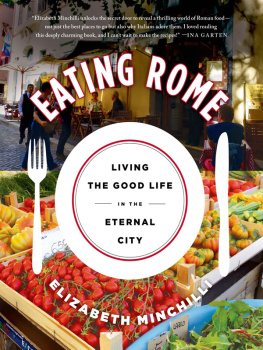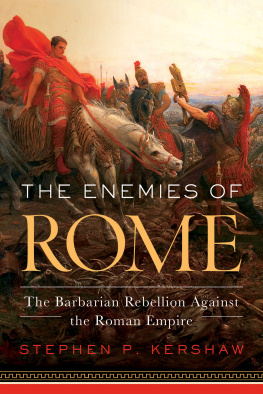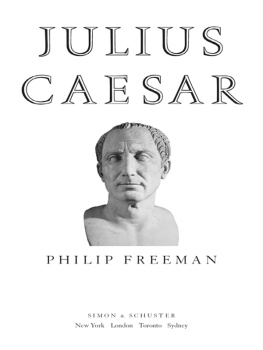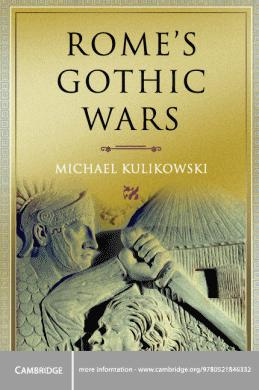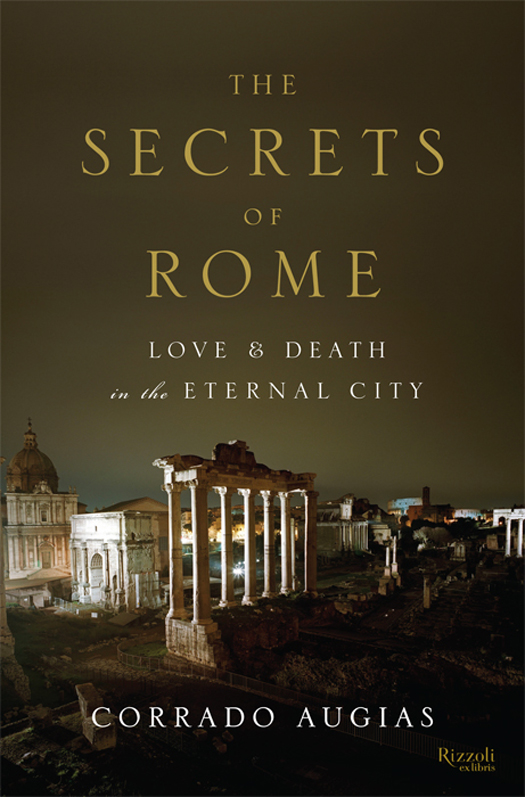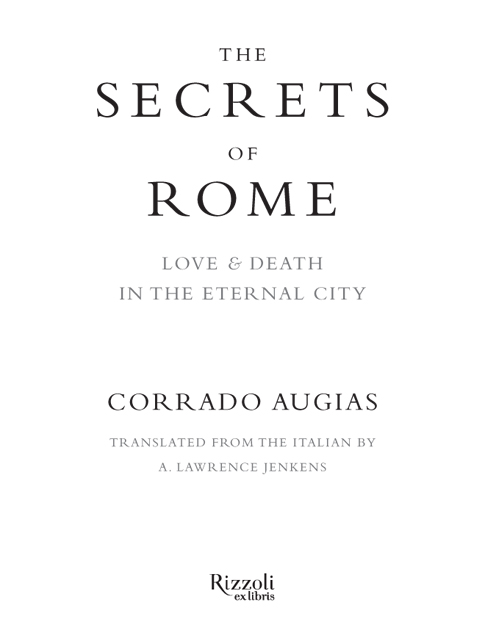Praise for Secrets of Rome
A rich, layered, highly readable narrative of the worlds most beautiful city.
Alexander Stille, author of
The Sack of Rome and Excellent Cadavers
First published in hardcover in the United States of America in 2007
by Rizzoli Ex Libris, an imprint of
Rizzoli International Publications, Inc.
300 Park Avenue South
New York, NY 10010
www.rizzoliusa.com
Edited by Julie Di Filippo and Alta L. Price
Jacket design: Gabriele Wilson
2007 Rizzoli International Publications
2005 Arnoldo Mondadori Editore S.p.A., Milano
This ebook edition 2014 Rizzoli International Publications
All rights reserved. No part of this publication may be reproduced, stored in a retrieval system, or transmitted in any form or by any means, electronic, mechanical, photocopying, recording, or otherwise, without prior consent of the publishers.
ISBN-13: 978-0-8478-4277-3
v3.1
Cest ici un livre de bonne foy, lecteur. Je veus quon my voie en ma faon simple, naturelle et ordinaire. Ainsin, lecteur, je suis moi-mesmes la matire de mon livre.
Montaigne, Essais, Avertissement au lecteur
To the Reader
You have here, Reader, a book whose faith can be trusted. Here I want to be seen in my simple, natural, everyday fashion. And therefore, Reader, I myself am the subject of my book.
Montaigne, The Complete Essays
EDITORS NOTE
This book was written, and will ideally be read, more as a novel than an essay; its simply a series of stories about Rome. Each of the worlds great cities has its own saga, and this book aims to recount the saga of Romeone of the longest, most dramatic, and most fascinating in world history. Where possible, the sources of quotes and anecdotes have been included for those interested in finding out more, and readers are invited to contact the publisher should they have information for future editions of this book. That said, the sheer richness of Romes history, characters, and chroniclers has brought forth stories that cant always clearly be traced back to the source. Hopefully these taleswhich resemble Rome in all its beauty, chaos, and timelessnesswill unfold like a stroll through the city itself.
PREAMBLE IN TWO SCENES
W HERE CAN WE BEGIN the story of the universe that is Rome? In a city as contradictory as this, filled with all the glory, ruins, and dust left behind by past centuries, its possible to see traces of every human event and sentiment in its historythe bravery and cowardice, the generosity and indolence, the resourcefulness and louche limpness of the lazy. Theres not a single event in its past that hasnt left a sign, scar, or scratch on its hide. Rome will never be a city of order, symmetry, events that unfold according to plan, or the coherent result of urban planning. If human history is nothing but violence and tumult, then Rome has been its mirror over the centuries, capable of reflecting each and every detail with painful fidelity, including those from which we would willingly look away.
So where can we begin, then? Every respectable story should start at the beginning, ab ovo as the Romans said, referring to the ovo or egg of Leda, which she laid after being seduced by Jupiter in the form of a swan. It was from this egg that Helen, the woman of such fatal beauty, was born. So let us, too, start ab ovo then, not just for chronological convenience, but also because the story, the myth of Romes origins, seems to contain a basic trait still recognizable after all the citys adventures and misadventures; put simply, its destiny. So from which of its origins shall we start? Everyone knows the legend of Romulus and Remus, but not everyone remembers the various versions of how these two legendary twins came into the world. It seems their mother was Rhea Silvia, a princess of Alba Longa who was forced to become a nun (as theyd have said in the seventeenth century) and enter the sacred college of the Vestal Virgins, whose members, among other duties, took a vow of absolute chastity. She was forced into this by her uncle, usurper of the throne, to prevent her from bearing any heirs who might jeopardize his dynasty. Instead, one day the young woman found herself pregnant, supposedly at the hands of a deity (an oft-repeated explanation), perhaps Mars himself. Following these branches of the family tree, this version leads us to Ascanius, son of Lavinia and the pious Aeneas. Can we believe this? Virgil did, or so he wrote, in his epic poem on the nations foundation, The Aeneid.
This legend, built up little by little, is known in other, more embarrassing versions recounted by Plutarch in his Life of Romulus. One day King Tarchetius of Alba Longa, a cruel man, witnessed the astonishing appearance of a gigantic male member that descended through the chimney and began to flutter around the house. The Etruscan oracles, even without having read Freud, explained that this was the spirit of Mars who, irritated with the king, wanted to produce a successor for him. To appease the irate god the king had to offer him a virgin; Tarchetius ordered his daughter to satisfy the thing that continued to flit about, but the girl, understandably, refused. A slave girl, who didnt have the option to say no, was called as a substitute.
These are the rather dishonorable events that led, nine months after the surreal encounter, to the birth of two boys whom the evil king, to avoid all risk, ordered to be murdered. Abandoned in a basket along the banks of the Tiber (like Moses), the twins were saved because the waters receded, and because a she-wolf, driven down from the nearby mountains by thirst, nourished them by offering her own breasts. But was she really a wolf? In his history of Rome, Livy insinuates that it wasnt a real wolf, but rather a woman, Larenzia, whom the local shepherds called she-wolf, another name for prostitute, because she so often sold herself to those rude men: Sunt qui Larentiam volgato corpore lupam inter pastores vocatam putent. [There are those who think that Larentia was called a she-wolf by the shepherds because she was a prostitute.] When twentieth-century Italian Fascists thought of giving the nickname children of the she-wolf to the children inducted into the partys youth organization they didnt realize, in their ignorance of history, the unintentional humor of that name.
The two boys, of less-than-flawless lineage, grew up revealing distinctly different temperaments. Remus was the more resolute, and seemed more suited to command. Romulus appeared physically weaker than his brother, but was also much more astute. When it came time to found the city, Romulus tricked his brother with a bet over which of them would first spot vultures in the Murcia Valley, where the Circus Maximus would later rise. The bet degenerated; Romulus reneged, and Remus was enraged. To provoke his brother, he jumped the furrow being dug to outline the citys perimeter, and was struck down by a blow from the hoe of an Etruscan assassin. With his brother gone, Romulus, consumed with fury, cried out, Sic deinde, quicumque alius transiliet moenia mea [The same will happen to anyone else who dares to trespass my walls].
Might the citys name derive from Romulus? Its possible, but by no means certain. Other hypotheses include the Etruscan word


